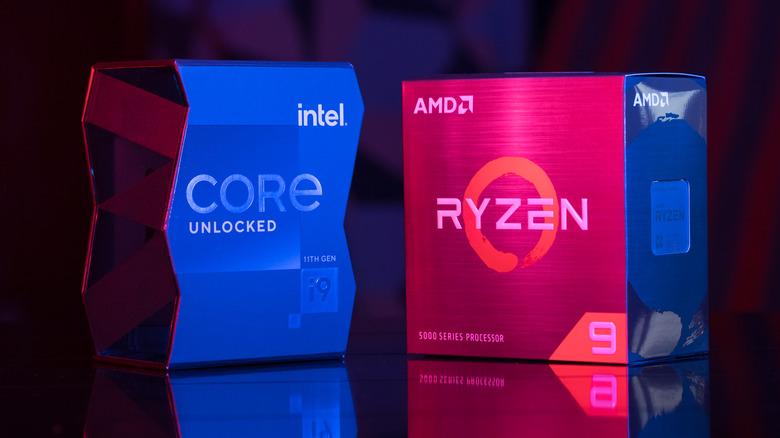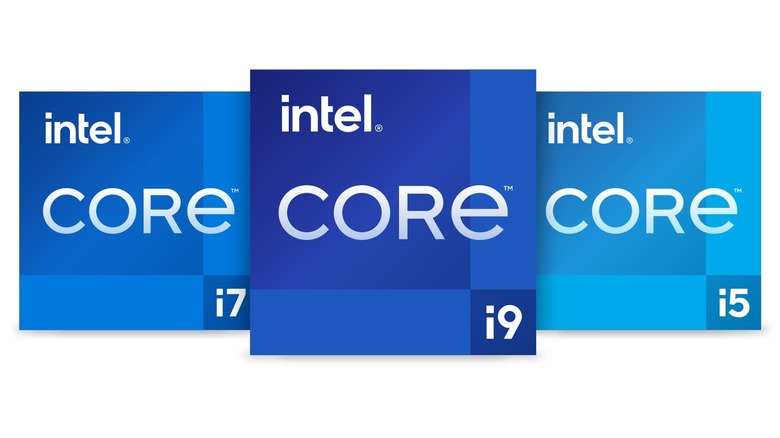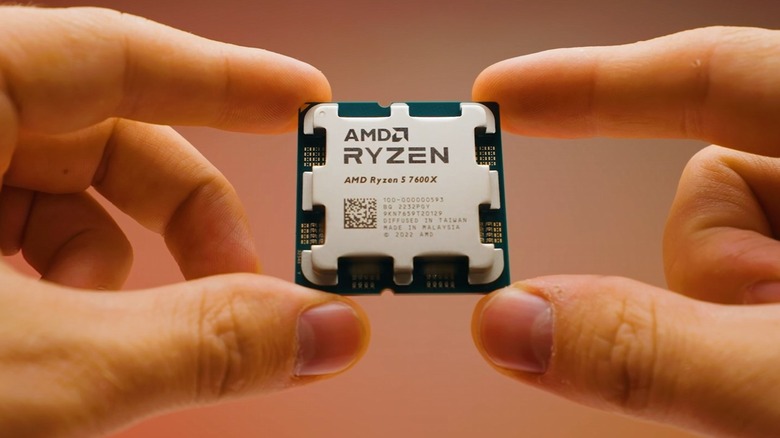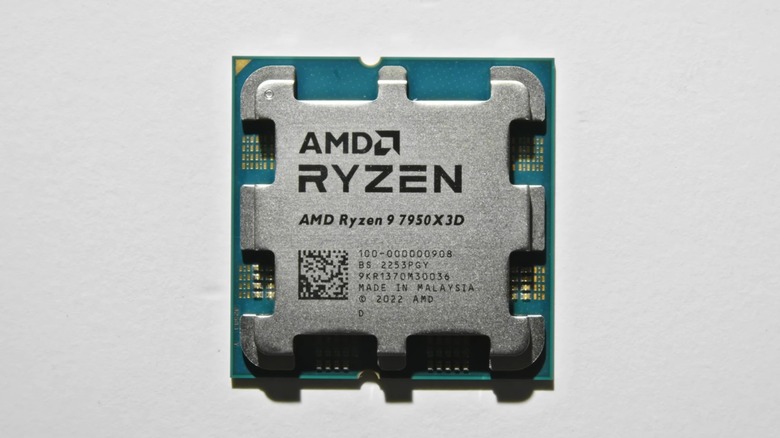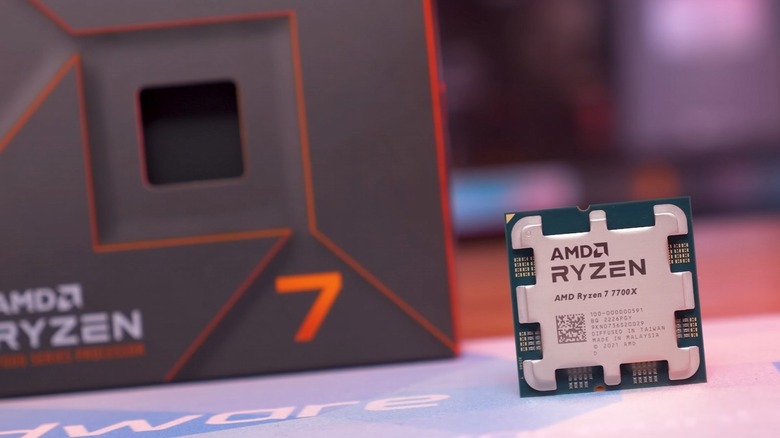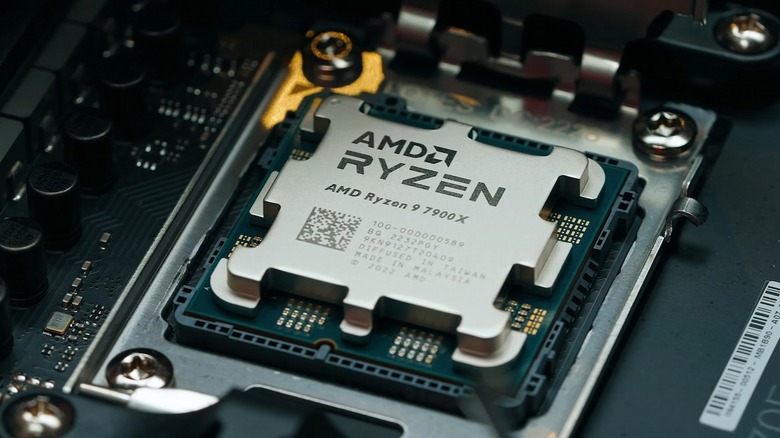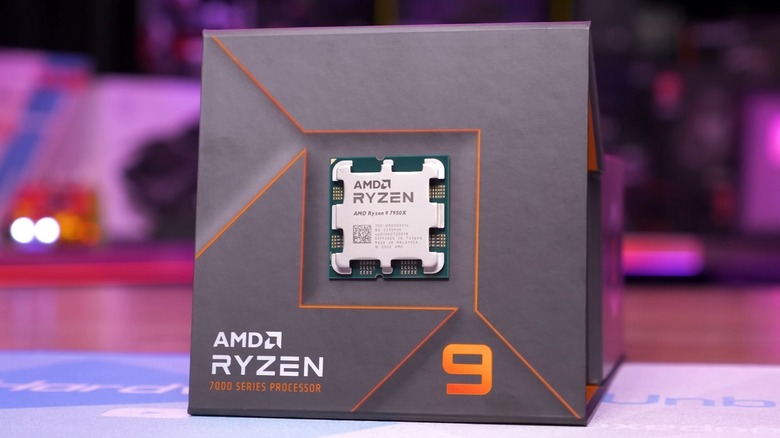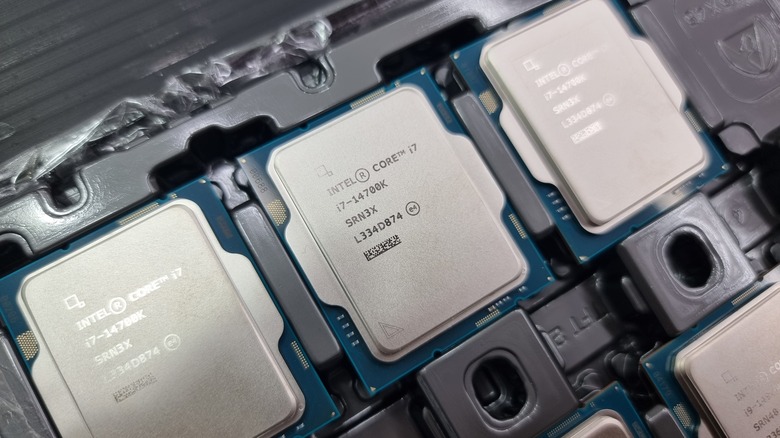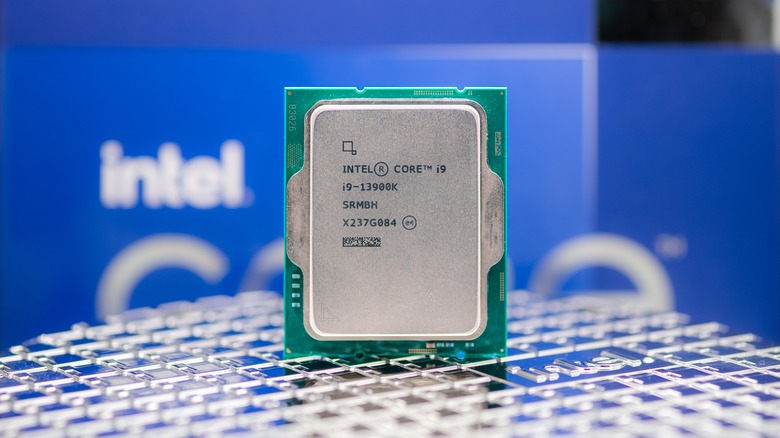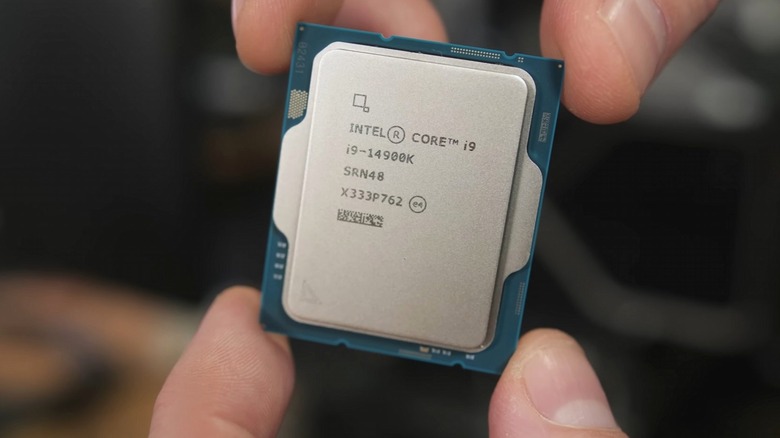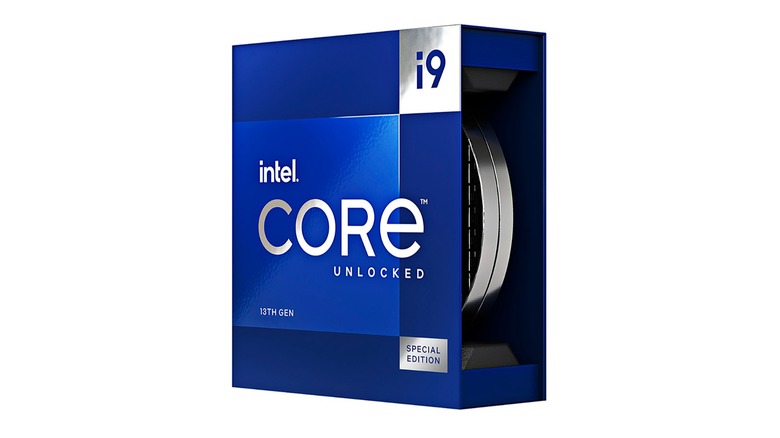The 10 Most Powerful Desktop Processors (Ranked By Geekbench)
We may receive a commission on purchases made from links.
The CPU is the beating heart of a desktop computer. Whether it's a blazing-fast gaming rig or a workstation designed for crunching through heavy multi-threaded workloads, having enough CPU grunt on hand has always been crucial. While the heady days of the so-called Megahertz War are well and truly behind us, Intel and AMD have continued to push each other to new heights with each CPU generation, improving single- and multi-core performance with each step of the way — even if AMD looks like it has the upper hand for now.
Ranking CPUs can be tricky, with differing benchmarks and use cases putting out different results. While they're certainly not perfect, synthetic benchmarks like Geekbench are a great way to get a general idea of the desktop CPU market, allowing us to pinpoint the best of the best from Intel and AMD and rank them in order.
Before we dig in, though, there are a couple of caveats. Firstly, we're focusing only on desktop CPUs, not server products. So you won't find any Ryzen PRO processors here. Secondly, we're basing this list solely on Geekbench's master list of CPUs, ranked by the single-core score — which means that Intel and AMD's latest CPUs aren't on our list, because they're not on Geekbench's at the time of writing. But with that out of the way, let's take a trip through some of the beefiest desktop CPUs available for anyone building a PC in 2024.
Intel Core i9-14900
We kick off our list of the most powerful desktop CPUs with a 14th-generation Intel CPU in the form of the Intel Core i9-14900. The i9-14900 is a lower-power, slower, and non-overclockable version of the flagship Raptor Lake Refresh Core i9-14900K that debuted at the start of 2024, a few months after Intel's K-series processors dropped.
The Core i9-14900 has the same CPU core and thread setup as its overclockable K-series sibling, with 8 Performance cores (P-cores) and 16 Efficient-cores (E-cores), for a total of 16 cores and 32 threads (the P-cores are hyper-threaded, capable of running two threads at once). The P-cores do the heavy lifting, while the E-cores focus on running small and background tasks. The main difference between the i9-14900 and the i9-14900K we'll talk about later is in the clock speeds and power consumption: the i9-14900 runs at turbo clocks of 5.6 and 4.3GHz for the P- and E-cores, with a base wattage of 65 watts.
Intel's decision to drop the clocks and power consumption means that the i9-14900 scores significantly lower than its full-fat sibling, but it doesn't do too bad overall, with 2,881 single-core and 17,466 multi-core points. That multi-core score is impressive, as we'll see later, and it's all thanks to the healthy number of cores and threads available. But, as we're ranking by single-core score, the i9-14900 ends up last on our list.
AMD Ryzen 5 7600X
AMD launched its 7000-series Zen 4 CPUs in 2022 to much fanfare and some criticism, mostly for the relatively poor value proposition of CPUs like the AMD Ryzen 5 7600X. That's not because it was a bad CPU, mind you, only that it was a $300 CPU at launch for a platform that also required pricey motherboards and DDR5 RAM — putting it up against not just Intel's Core i5-12400F for gaming, but against AMD's own Zen 3 CPUs, which had dropped significantly in price.
The situation has changed now, though, with prices for the 7600X dropping to below $150 on most retailers and associated platform costs also much lower. So while the 7600X may not have been the stone-cold hit its predecessor was at launch, the 6-core, 12-thread CPU now occupies a solid place in the desktop processor hierarchy.
AMD's single-core performance advantage over Intel in 2022 was so strong that the Ryzen 5 7600X still outpaces Intel's Core i9-14900 in Geekbench despite the latter being two or so years newer — the AMD manages 2,891 points in the single-core benchmark. The multi-core score is predictably much lower, though, owing to having half the number of overall threads: the Ryzen 5 7600X scores 12,952 in Geekbench's multi-core test, making it the weakest CPU for heavily threaded workloads in this top 10 list. But that's to be expected, with only six physical CPU cores.
AMD Ryzen 9 7950X3D
AMD's X3D CPUs have been something of a revelation since the 2022 debut of the Ryzen 7 5800X3D, with their increased L3 cache — thanks to vertically-stacked dies in a configuration that AMD calls 3D V-Cache — helping performance massively in some games. The extra cache makes X3D CPUs like the Ryzen 7 7800X3D some of the best AMD CPUs for gaming that money can buy — despite AMD disabling manual CPU overclocking on the X3D CPUs. While that particular AMD CPU doesn't make our list, its bigger brother, the AMD Ryzen 9 7950X3D, does.
The Ryzen 9 7950X3D, as the name suggests, is a 3D V-Cache-equipped version of the flagship Zen 4 CPU, the 7950X. The 7950X3D retains the 16 cores and 32 threads of the 7950X but bumps the cache up to 144MB from the 80MB of the non-X3D variant. Unfortunately, this bump in cache came with a slight reduction in base clock speeds, with the 7950X3D's 16 cores now running at a baseline frequency of 4.2GHz instead of 4.5GHz, although the max boost frequency stayed at 5.7GHz. The Ryzen 9 7950X3D debuted in February 2023 alongside the 7900X3D and 7800X3D.
The 7950X3D is a solid performer in Geekbench, with a single-core score not far removed from the absolute cream of the crop of desktop CPUs. The 16-core X3D CPU manages 2,930 and 19,696 points in single- and multi-core tests respectively, with the latter proving to be one of the best results on Geekbench's charts — and the former isn't too shabby either.
AMD Ryzen 7 7700X
All of AMD's Zen 4 CPUs on the Geekbench list perform nearly identically in Geekbench's single-core benchmark, with the architecture's strong instructions per clock (IPC) performance helping Zen 4 CPUs acquit themselves very well for what are essentially two-year-old products at the time of writing. The AMD Ryzen 7 7700X is no different, with the mid-range part in AMD's Zen 4 lineup putting up strong single-core numbers that are within spitting distance of its bigger brothers (and actually managing to outscore one of them) and not too far off Intel's newer CPUs.
Like the Ryzen 5 7600X, the 8-core, 16-thread 7700X had some pricing issues at launch, with the $400 MSRP combined with DDR5 memory and motherboard costs prompting some reviewers to favor Intel's more affordable products, like the Intel Core i7-12700K, over AMD's brand new offering. As with the 6-core AMD chip, though, times have changed: the 7700X sits comfortably in Geekbench's top 10, showcasing its strong performance without major pricing concerns. It's much cheaper than it was when new, and supporting parts — like the best DDR5 kits for gaming, for example — are significantly more affordable as well.
The Ryzen 7 7700X manages to just about beat the 7950X3D in Geekbench's single-core benchmark, with 2,947 points. The reduced number of cores compared to AMD's higher-end CPUs — and all the Intel CPUs on this list — means it's not nearly as strong in multi-core, however, with only 15,417 points.
AMD Ryzen 9 7900X
The AMD Ryzen 9 7900X sits right above the Ryzen 7 7700X in AMD's Zen 4 product stack, so it follows that it'd be above the 8-core part in Geekbench rankings, too — and that's precisely what we got. That said, the raw performance difference between the two is pretty minuscule, with single-core scores almost equal. The Ryzen 9 7900X runs away in multi-core, but that's to be expected given it's a 12-core, 24-thread CPU. But more on that a bit later.
Unlike the lower-end parts in AMD's Zen 4 range, the 7900X — and the 7950X — split its CPU cores over two chiplets, with two Core Complex Dies (CCDs) with eight cores each, plus a third Input: Output Die (IOD). AMD simply disabled two cores on each CCD for the 7900X, giving us 12 cores — capable of boosting to 5.6GHz — and 24 threads. This wasn't new to AMD's higher-end chips, but the Zen 4 multi-CCD processors had improved core-to-core latency over Zen 3, which was a welcome improvement for the dual-CCD CPUs. While the increased IPC likely provided the biggest leap over Zen 3, improved latency definitely didn't hurt.
As far as the numbers go, the 7900X manages 2,955 points in Geekbench's single-core and 17,950 points in multi-core, putting it precisely in between the 8- and 16-core parts in AMD's Zen 4 lineup. The single-core scores are mostly all a wash, though, with the differences likely only visible in dedicated single-core benchmarks like Geekbench.
AMD Ryzen 9 7950X
In a top five dominated by Intel CPUs — at least, for the moment, as we're not sure where AMD's Zen 5 CPUs will rank once they make the Geekbench list — the AMD Ryzen 9 7950X flies the flag for Team Red, sitting but a stone's throw away from some of Intel's very best in this particular test.
The 7950X launched in late 2022 alongside the rest of AMD's Zen 4 lineup, with its 16 cores and 32 threads — and equally premium $699 MSRP — it sits at the top of the product stack above the Ryzen 5 7600X, Ryzen 7 7700X, and Ryzen 9 7900X. As with the 7900X, the 7950X is a dual-CCD design, just with unlocked, unrestricted CCDs with eight cores each running at a maximum boost clock of 5.7GHz. Reviewers loved the Ryzen 9 7950X, and even outlets that were somewhat lukewarm on the rest of the lineup praised the flagship Zen 4 CPU's impressive performance.
AMD's 16-core beast had Intel's contemporary Alder Lake CPUs beat hands down, a state of affairs reflected by how none of those 2022 processors are in Geekbench's top 10. Intel didn't rest on its laurels, of course, and has Geekbench bragging rights at the time of writing, but the Ryzen 9 7950X's 2,985 single-core and 19,453 multi-core scores are still impressive and significantly better than most other CPUs money can buy.
Intel Core i7-14700K/KF
Despite only being upper-midrange parts, the Intel Core i7-14700K and KF — part of Intel's troubled 13th- and 14th-generation Raptor Lake family of CPUs — perform great according to Geekbench, just about managing to sneak ahead of AMD's ostensibly more powerful Ryzen 9 7950X. Being a year newer helps, of course. They launched in late 2023 — but it's still a commendable achievement for a company and a range of products that's been in the doldrums.
It was a well-received launch, too, with the competitively-priced $410 part generally performing better with games than AMD's non-X3D Zen 4 offerings and providing decent value thanks to continued support for more affordable DDR4 memory. But owners of this 8+12-core part lost out elsewhere, with high power consumption and temperatures compared to AMD's parts — and even the older Intel Core i7-13700K — muddying the waters for those deciding between AMD and Intel.
You can't argue with the Geekbench scores, though, and the graphics-less 14700KF scores 2,993 and 19,565 points in the single- and multi-core benchmarks, respectively. Interestingly, despite having the same core setup and clock speeds, the GPU-equipped i7-14700K scores lower than the KF with 2,944 and 19,107 points. But as they should be the same CPU, we've combined them into one listing and ranked it based on the higher of the two scores.
Intel Core i9-13900K/KF
Single-core scores above 3,000 points are — for the time being — exceedingly rare, with only three processors ever breaking past this threshold... and all of them are Intel CPUs. First of the three is the 13th-generation flagship CPU, the Intel Core i9-13900K.
The Core i9-13900K — and its GPU-less sibling, the i9-13900KF — were 24-core, 32-thread CPUs, consisting of eight multi-threaded P-cores and 16 E-cores. The former boosted to 5.8GHz, while the latter topped out at 4.3GHz. It was a beast when it launched, toppling the AMD competition and earning it the title of the fastest CPU on the market for a time — with one major caveat, of course. Intel relied on feeding tons of power into the Core i9-13900K to drag it to the top, and it showed: AnandTech measured 334 watts of power consumption from the flagship CPU in its testing, more than 100 watts higher than AMD's Ryzen 9 7950X.
In the isolated world of a synthetic benchmark, though, the benefits of that much power and clock speeds are obvious: the Core i9-13900K scores 3,003 in the single-core test and 20,218 in the multi-core tests — making it an elite CPU as far as Geekbench goes. Interestingly, the i9-13900K outperforms the i9-13900KF here, which isn't the case with the i7-14700K and i9-14900K; the GPU-less variant comes in at 2,920 and 19,6560 points despite having the same specs.
Intel Core i9-14900K/14900KF
In many ways, the Intel Core i9-14900K and the other 14th-generation Raptor Lake CPUs — not to be confused with Intel's 14th-gen Meteor Lake processors — were the end of an era for Intel. This was the last Intel flagship to have hyper-threading, with the new Core Ultra 9 285K abandoning the multi-threaded approach for a single-core, single-thread design. The i9-14900K also marked the end of the road for Intel's power-hungry approach to performance, with the company's Arrow Lake CPUs setting their sights on countering AMD's traditional efficiency advantage.
But we're getting sidetracked, here: those new CPUs haven't made their way to Geekbench's charts, so for now, the Intel Core i9-14900K still ranks as one of Intel's — and the desktop CPU market's — best. The Core i9-14900K launched with the rest of the 14th-generation Raptor Lake Refresh CPUs at the end of 2023, bringing minor improvements over the 13th-generation CPUs. Intel bumped up the clock speeds ever so slightly — the i9's P-cores now boosted to 6GHz vs. the 13th-gen i9's 5.8GHz, while the E-cores climbed to 4.4GHz vs. 4.3GHz.
The result? A minor uptick in Geekbench scores to 3,097 and 20,763 single- and multi-core points, respectively — with the GPU-less KF version ahead once again, albeit by an almost insignificant margin (3,080 vs. 3,097 points). The performance uplift wasn't for free, though, and reviewers noted that the Core i9-14900K was more prone to overheating and throttling than its predecessor.
Intel Core i9-13900KS
Up until debuting its Arrow Lake CPUs, Intel's main method of taking the fight to AMD was pushing core speeds and power consumption to the limit, running its processors as hard as they could to eke out every little advantage. While focusing on power efficiency in the future is likely the better choice for Intel, it's impossible not to miss the days of brutally hot, power-hungry flagship CPUs — if only as a historical curio. And there were few more brutal than the Intel Core i9-13900KS, which launched in early 2023.
KS was an affix that few Intel CPUs were ever good enough to carry, a special product reserved for the highest-clocked examples of any given Core i9 CPU. The Core i9-13900KS was a landmark for Intel and the x86 desktop CPU market, being the first CPU capable of running at 6GHz without needing exotic cooling. Practical? Debatable, but it was at least a feather in Intel's cap after losing the 5GHz race to AMD 10 years prior.
The Core i9-13900KS' raw clock speed advantage means it sits at the top of Geekbench's charts, with 3,135 and 21,719 points in the single- and multi-core tests, respectively. This sort of performance doesn't come cheap, though, and while the CPU itself is much more affordable than it used to be, its 360-watt power consumption (as tested by AnandTech) puts it at the far edge of "mainstream" as far as we're concerned. But hey, it's a bona fide desktop CPU, so it counts.
